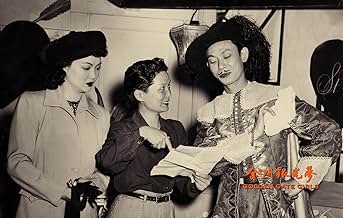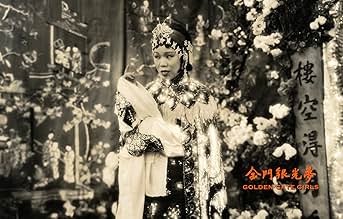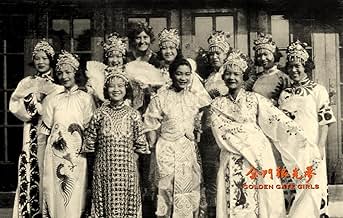The documentary explores Esther Eng's life and work alongside Anna May Wong and Dorothy Arzner, pioneering women filmmakers who broke barriers in the industry, highlighting their contributio... Read allThe documentary explores Esther Eng's life and work alongside Anna May Wong and Dorothy Arzner, pioneering women filmmakers who broke barriers in the industry, highlighting their contributions to cinema across cultural and gender lines.The documentary explores Esther Eng's life and work alongside Anna May Wong and Dorothy Arzner, pioneering women filmmakers who broke barriers in the industry, highlighting their contributions to cinema across cultural and gender lines.
Featured reviews
I think that Wei handles her subject with a remarkable tenderness that really helps elevate the documentary to the interesting and elegant piece it is. The parallels that she draws between Eng, Arzner, and Wong not only place Eng among (arguably) better known contemporaries in a (Sino-)American film cannon, but also serves to highlight aspects of Eng's life as well as the film industry at large that develop this rich story. Wei's interactions with her interviewees, all of whom seem to have adored Eng, make this truly such a lovely documentary. I really enjoyed the archival footage of the Chinese communities in San Francisco and New York, and I wish there was more of that, rather than the animations that (for me personally) hold back the aesthetics of the film. While discussing this documentary with my classmates, one of them told us about an essay called "Venus in Two Acts", wherein the cultural historian Saidiya Hartman coined the term "critical fabulations", in which the artistic practice is able to counteract "the violence of the archive and the way power is registered through absences and silences". I found this analysis - that Wei is trying to reconstruct Eng through the bare-bones traces of her work and herself that are recorded in history -- really fascinating, and an interesting lens to view this documentary through.
Golden Gate Girls (2013) is an ambitious documentary directed by S. Louisa Wei, focused on highlighting Esther Eng's films and life works that were essentially erased from history. The film spoke about Eng's story but also put her life within a broader context of female filmmaking and Asian-American cultural history. However, in my opinion, because the film attempted to provide biographical and historical context, it also ends up detracting from Eng's narrative at the end.
One of the most controversial choices Wei makes is the inclusion of the significant screen time dedicated to Dorothy Arzner and Anna May Wong. I understand why Wei chose to do this as both Dorothy Arzner and Anna May Wong were trailblazers in the film industry, and to properly frame Eng's story within the marginalized film pioneers during that time, it was needed to compare their accomplishments and show how little is known about Eng compared to how much is known about Arzner and May Wong. It helped emphasize how special Eng's accomplishments were, especially considering she was female, Chinese, and queer. However, this contextualization also came at a cost. I think the amount of time spent on this context also drew away the film's focus. Instead of deepening the viewer's understanding of Eng, I walked away from the film remembering more of Anna May Wong's and Dorothy Arzner's life. This is also especially because Eng had so few archival photos and graphics left now.
Ultimately, Golden Gate is an important work of recovery and does give the spotlight to a figure that has been unjustly erased form history. However, I don't particularly agree with the techniques to frame Esther Eng's life.
One of the most controversial choices Wei makes is the inclusion of the significant screen time dedicated to Dorothy Arzner and Anna May Wong. I understand why Wei chose to do this as both Dorothy Arzner and Anna May Wong were trailblazers in the film industry, and to properly frame Eng's story within the marginalized film pioneers during that time, it was needed to compare their accomplishments and show how little is known about Eng compared to how much is known about Arzner and May Wong. It helped emphasize how special Eng's accomplishments were, especially considering she was female, Chinese, and queer. However, this contextualization also came at a cost. I think the amount of time spent on this context also drew away the film's focus. Instead of deepening the viewer's understanding of Eng, I walked away from the film remembering more of Anna May Wong's and Dorothy Arzner's life. This is also especially because Eng had so few archival photos and graphics left now.
Ultimately, Golden Gate is an important work of recovery and does give the spotlight to a figure that has been unjustly erased form history. However, I don't particularly agree with the techniques to frame Esther Eng's life.
Louisa Wei beautifully fills gaps in feminist filmmaking history by detailing the life and works of Esther Eng, an openly queer woman of color in the filmmaking industry in the mid-20th century. Hollywood turned their backs on Esther, and all but one of her films have been lost to time, but Golden Gate Girls reveals a portrait of a determined and talented woman filmmaker in Esther Eng. One particularly haunting aspect of the film was the existential horror provoked when the filmmaker struggled to find any surviving friends or family members of Esther's. Stories about Esther Eng's film reels ending up in dumpsters, discarded and forgotten, prompt questions about who decides which films and filmmakers exist forever in cultural memory, and which people history chooses to forget.
Golden Gate Girls is a documentary by S. Louisa Wei about the filmmaking journey of Esther Eng. I've never heard of the name "Esther Eng" before, and this film introduced me to her. She was a remarkable filmmaker who was a woman of color and openly queer in a time where it was difficult to be either. Esther Eng was almost completely forgotten, where most of her films and works are lost and didn't survive archival. This documentary consolidates a decade worth of research Wei performed on Esther, preserving her legacy and carving a name for her in history.
The documentary is well-paced and also includes the lives of industry leaders: actress Anna May Wong and fellow filmmaker Dorothy Arzner. This kept the film interesting and made it more dynamic, where the viewers would compare and contrast the successes of these women. It seems to me Esther Eng faced a lot of unfairness and discrimination in the industry, where she was often overlooked just for her minority identity. Arzner was also openly gay and Anna May Wong was also Asian American, but Ester Eng got the short end of the stick and was least recognized for her talent.
Wei takes us through discovering bits and pieces of Esther's life, making it super engaging and like we were in the research process with her uncovering lost histories. The theatricized voiceovers and readings of quotes made Ester Eng come to life, which made her more memorable to me.
I've learned a lot about a woman I would have otherwise known nothing about. Best documentary I've seen so far!
The documentary is well-paced and also includes the lives of industry leaders: actress Anna May Wong and fellow filmmaker Dorothy Arzner. This kept the film interesting and made it more dynamic, where the viewers would compare and contrast the successes of these women. It seems to me Esther Eng faced a lot of unfairness and discrimination in the industry, where she was often overlooked just for her minority identity. Arzner was also openly gay and Anna May Wong was also Asian American, but Ester Eng got the short end of the stick and was least recognized for her talent.
Wei takes us through discovering bits and pieces of Esther's life, making it super engaging and like we were in the research process with her uncovering lost histories. The theatricized voiceovers and readings of quotes made Ester Eng come to life, which made her more memorable to me.
I've learned a lot about a woman I would have otherwise known nothing about. Best documentary I've seen so far!
By excavating Esther Eng's legacy in film, Golden Gate Girls inspires a greater discourse on the forgotten parts of cinematic history. As a viewer, I was struck by the depth of Wei's research; the film takes us on a journey through film snippets, interviews, and archive pictures and what emerges is a tender portrait dedicated to a woman whose artistic imprint may otherwise be lost to history. It was very disheartening to see how little even Eng's friends and family knew of her work, exposing how the Western, male dominated world of film erases the contributions of queer people, people of colour, and women. I was especially moved to learn that Eng co-wrote It's a Woman's World (an all-female cast film) decades ahead of its time.
Details
Box office
- Budget
- HK$800,000 (estimated)
- Runtime
- 1h 30m(90 min)
- Color
Contribute to this page
Suggest an edit or add missing content











